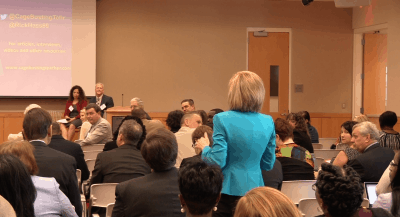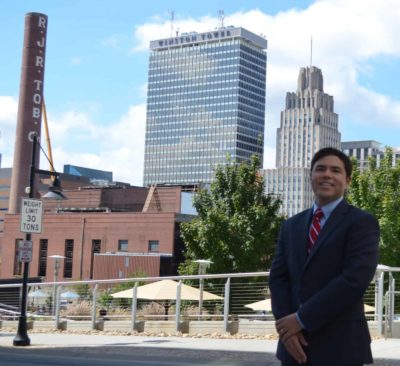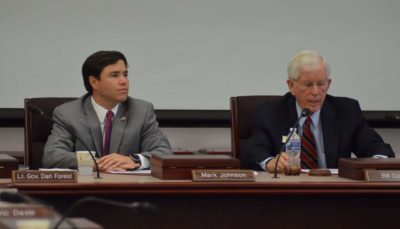
At various times, we at EdNC.org have written about the virtual schools we have in North Carolina. But some readers have asked: What in the world is a virtual school anyway? Who do they serve and how do they serve them?
For starters, there are three virtual schools in North Carolina. One, the North Carolina Virtual Public School, is run by the state and is an extension and companion to the traditional public school system.
In addition to that school, there are two virtual charter schools, which both function independently as schools in their own right, separate from any district or any brick-and-mortar schools.
Let’s go through the three one by one.
Virtual Public School
The North Carolina Virtual Public School — NCVPS for short — is open to high schools and participating middle schools in North Carolina. In the 2018-19 school year, it had 32,081 students enrolled. It is the second largest virtual school in the country.
The school started in the summer of 2007, and according to Mia Murphy, the chief operations officer for the school, it is a supplement to students’ typical public school experience.
“We exist to expand and enhance the educational opportunities…of an existing school,” she said.
So what’s important to know about the state virtual public school is that it is not its own school. It does not have full-time students and doesn’t grant degrees. Students don’t get transcripts or report cards. Instead, students from traditional public schools, home schools, charter schools, or private schools can use the virtual program to access classes. The grade they get in those classes is then transmitted back to the district or school from which the student came.
“Our reason for being is to pretty much make sure the students in North Carolina have opportunity regardless of zip code,” Murphy said.
NCVPS offers basically every class a student could need for graduation. If a student can’t take an advanced placement course at their regular school, NCVPS probably offers it. The same is true for foreign languages. Basically, it exists to offer the courses that a students’ ordinary school isn’t able to.
Murphy said there are all kinds of reasons why a student might use the virtual public school. Some students are advanced and trying to get ahead. Others are in rural parts of the state where advanced placement courses are hard to come by. Others have failed a course and need to retake it. Some are just trying to take classes that they can’t fit into their ordinary day-to-day schedule.
For most students, NCVPS classes aren’t something they do from home. Murphy said that most schools have a period in the day when students can do their online work. Of course, students can work from home if they need to, particularly in the summer when they aren’t in school.
Murphy said that the school is constantly reworking what they do to make sure there is no decline in quality. And because staff know that online learning can be isolating, the school works hard to engage with students.
“If you’re a traditional high school parent, you may never hear from your teacher unless it’s something really great or bad,” she said. “Our teachers are constantly keeping in touch with the parents.”
Virtual charter schools
There are two virtual charter schools in North Carolina: North Carolina Virtual Academy and North Carolina Cyber Academy. They are separate and distinct from the North Carolina Virtual Public School in that they are standalone schools. They serve as a substitute for a typical brick-and-mortar experience.
They are charter schools, so they are public schools that receive funding from the state. However, as charters, they are exempt from some of the requirements traditional public schools are held to, and they are operated not by a district or the state but by independent organizations. North Carolina Cyber Academy was previously called North Carolina Connections Academy and was run by Pearson. Now, its day-to-day operations are run by the school’s board of directors. North Carolina Virtual Academy is run by K-12 Inc.
Both schools opened in 2015 and have more than 2,000 students. State law caps the population of the schools at 2,592. Both are pilot programs and their classes are taught by certified North Carolina teachers.
For the 2017-18 school year, both schools received school performance grades of D and neither met growth. Twenty-five percent of the students at Virtual Academy are economically disadvantaged. Cyber Academy’s student population is 18.3% economically disadvantaged. This is the most recent information available as of the writing of this article. The school performance grades for 2018-19 come out tomorrow.
North Carolina Virtual Academy music teacher Michelle Rose lives in Cary. The school itself is based out of Durham, but its students come from all over North Carolina.
“We offer full courses of study, all of the requirements,” she said. “If students are planning to go to college, we offer all the requirements for a foreign language. If there is some sort of class that isn’t offered, there are ways to take that class as well.”
Students who attend the virtual charter schools can’t be enrolled in another school or district, but the school takes pains to make sure the students feel like they are having at least something close to a typical school experience.
Nathan Currie, superintendent of North Carolina Cyber Academy (NCCA), said his school is “a school in every sense of the word.”
“NCCA is not just a place to take classes. Our students and parents take pride in their school. We provide numerous events at which students get together for academic, social, and philanthropic purposes,” he said. “Occasionally, we have students who attend our school for a short-term need, but that is not the norm. Our goal is to provide an environment in which all students can learn, succeed, and grow to adulthood.”
Rose said that North Carolina Virtual Academy has meet-ups every couple of weeks so that students can see each other face-to-face. They have back-to-school meet and greets. They even have a middle school dance, high school prom, and high school graduation that happens in person.
“Even though students are attending virtually, there are plenty of opportunities for them to interact with students at the school,” Rose said.
There are all kinds of reasons why students attend the virtual charter schools, from traveling for sports, to students who have been bullied, and even youth who just prefer to do things online.
“I think that’s what makes this school amazing,” Rose said. “We have students from all over, from all different walks of life.”
Currie said that life circumstances are one reason why students choose his school.
“We have had students who have required long-term hospitalization and were unable to attend their hometown school,” he said. “Others have been professional athletes, actors, dancers, and singers. Our virtual school can travel with you and can be accessed from a movie set, locker room, airport, or hotel room.”
Many reading this who have only experienced a typical school experience may ask themselves why anyone would want to attend a virtual school. Here is what Currie has to say about that.
“Computers, cell phones, gaming devices…are ubiquitous in our lives today — why shouldn’t they be integral to the educational process? The purpose of a K-12 education is to prepare our state’s children for the future, be it college or career,” he said. “Our school is part of a pilot program that set out to embrace technology and show how education can be adapted to meet the needs of any student.”
Recommended reading



